Project summary: Osteoarthritis (OA) is the most common form of joint disease globally and is associated with significant morbidity and disability. Increasing evidence points to an important inflammatory component in the development and progression of OA. The precise pathways involved in OA inflammatory processes remain to be clarified. Basic calcium phosphate (BCP) and calcium pyrophosphate dihydrate (CPP) crystals can induce inflammation and arthritis and recent studies point to a potential pathogenic role in OA. This long-standing project seeks to explore the relationship and potential mechanistic pathways linking calcium-containing crystals and OA
This project is funded by the Health Research Board and the Mater Rheumatology Research Fund. The work is performed by Prof Geraldine McCarthy at the Mater Hospital and the UCD Clinical Research Center in collaboration with Dr Aisling Dunne, Trinity College Dublin

How calcium crystals contribute to osteoarthritis
Project summary: Gout is the most common inflammatory arthritis and it remains poorly treated worldwide. It is associated with significant mortality. In recent years,major advances have been made in understanding the molecular and complex genetic basis of adult-onset hyperuricaemia based on genome-wide scanning approaches. The discovery of new genes associated with disease often indicates novel pathophysiological pathways that can be further investigated by more classical approaches. Such pathways are potentially modifiable, Our genetic approach will therefore aim to identify additional genes that contribute to hyperuricemia, and in addition, genes that are linked to susceptibility to gouty arthritis and its relationship with other metabolic conditions. Identification of these genes will help to identify the pathophysiological pathways that regulate gouty inflammation as well as regulation of the inflammatory response, and may provide novel targets for development of future treatments. We are recruiting patients with crystal –proven gout as part of of a very large well ascertained gout sample set for use in genome-wide genetic studies.
The Irish part of the study is funded by the Mater Rheumatology Research Fund. It is performed at the Mater Misericordiae University Hospital in collaboration with Professor Tony Merriman, Department of Genetics, University of Otago, New Zealand
Patients with inflammatory arthritis die prematurely of cardiovascular disease. Despite the well-known risk of cardiovascular death in patients with inflammatory arthritis there are no recognized guidelines on the use of anti-platelet therapy. This is due, in part, to the fact that many previous studies of platelet function in patients with inflammatory have not used physiologically relevant assays of platelet function. There is a compelling rationale to understand platelet function in inflammatory arthritis since platelet hyper-reactivity is a potentially modifiable risk factor for cardiovascular disease in inflammatory arthritis
To date, using donor and patient blood samples, an assay that rapidly and reliably measures the interactions of platelets with surface-immobilized von Willebrand factor (VWF) under arterial shear has been developed and characterized. The dynamic platelet function assay (DPFA) mimics the fundamental dynamic behavior of thrombosis in vivo.
The aim of this study is to characterize dynamic platelet function in patients with active inflammatory arthritis (Rheumatoid arthritis, psoriatic arthritis, ankylosing arthritis and gout) compared to when a low disease activity state or remission has been achieved.
The study is funded by an investigator-initiated research grant from Pfizer. It is a collaborative study between the Mater Misericordiae University Hospital (Prof Geraldine McCarthy) and the Royal College of Surgeons in Ireland (Professor Dermot Kenny).